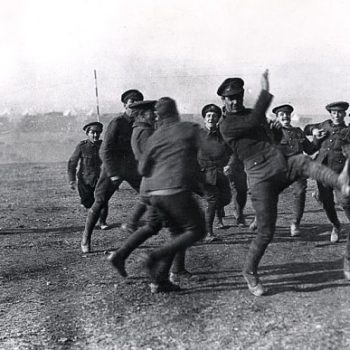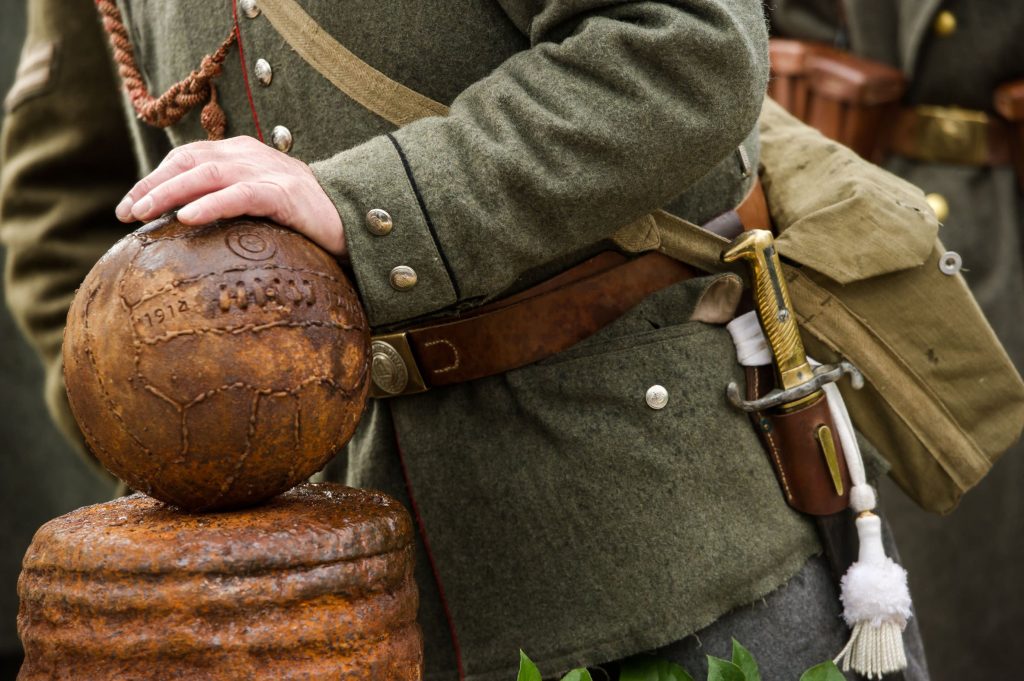
Anyone thinking back to 1914’s ghastly trench warfare would be forgiven for dismissing out of hand the suggestion that opposing forces got out of their trenches on Christmas Day to have a game of football. Even if enemies could put their differences aside for a few hours, there is the logistical problem of finding a football and a piece of land not bombed to bits or littered in human body parts. But the soldiers did put their differences aside to meet in No Man’s Land so is it so much more incredible that they also kicked a ball around together? In fact, there is evidence that such a match took place – but it is not overwhelming.
Many letters written by soldiers at the time refer to soldiers playing football during the truce but most are not clear if the writer actually witnessed the match or just repeated a rumour going around. Other letters don’t make it clear if the match was just between allied soldiers or if the Germans joined in. For example:
Bolton Chronicle 2nd January 1915: “A very interesting letter has been sent by Mr J A Farrell, a Bolton Post Office employee. The letter is sent to the Post Office and reads: ‘…In the afternoon there was a football match played beyond the trenches, right in full view of the enemy’…”

Does Mr Farrell mean the match was played simply between allied soldiers or did the Germans also take part? Other letters say that the opposing sides wanted to arrange a football match but it fell through for lack of a ball or because of intervention by superiors. For instance:
Rugby Advertiser, January 16th 1915: “Walter Cooke, son of Mr H Cooke of Church Lawford has written home to thank his friends for the plum pudding and good things they sent him for Christmas. He says: ‘They wanted to play at football but that fell through. They kept their word, and did not fire a shot all Christmas Day and Boxing Day’.”
The letter usually cited as evidence for such a match (and a score of 3-2 to the Germans), comes from The Times on January 1st, 1915 in which an anonymous major states: “The … (censored) Regiment actually had a football match with the Saxons, who beat them 3-2.” But this is also ambiguous: is the major quoting hearsay or did he actually witness the match himself? Seaton and Brown (Christmas Truce, Pan Books 1984) also point out that a German reference to a match also had a score of 3-2 and go on to say: “The fact two scores of 3-2 occur in the accounts of Christmas Day football must be assigned either to a curious coincidence or to mistaken memory. The two matches referred to could not have been the same one; in that the units concerned were separated not only by geographical distance but also by the river Lys.”
However in 1983 a former Territorial of 6th Cheshires, Ernie Williams, claimed in a UK TV interview that he had taken part himself in the famous match: “The ball appeared from somewhere, I don’t know where, but it came from their side – it wasn’t from our side that the ball came. They made up some goals and one fellow went in goal and then it was just a general kickabout. I should think there were about a couple of hundred taking part. I had a go at the ball. I was pretty good then, at 19. Everybody seemed to be enjoying themselves. There was no sort of ill-will between us. There was no referee, and no score, no tally at all. It was simply a melee – nothing like the soccer you see on television. The boots we wore were a meance – those great big boots we had on – and in those days the balls were made of leather and they soon got very soggy.”
Williams was at Wulverghem (just north of Ploegsteert, Belgium) where he says no man’s land was not broken up by shell fire as it was elsewhere.
Today, Ploegsteert is a popular destination for tourists and history buffs who are interested in exploring the Western Front and learning more about the events of World War I. The nearest airport to Ploegsteert is Lille Airport (also known as Lille-Lesquin Airport), which is located approximately 30 kilometers (18.6 miles) to the southeast of Ploegsteert. If you are flying to Ploegsteert from London, you can use airport parking services at London’s airports to park your car before taking a flight to Lille Airport. Most airports in London offer a range of parking options, including short-stay, long-stay, and meet and greet services, which can provide you with a convenient and secure place to park your vehicle while you travel. Some airport parking providers also offer additional services such as car washing and detailing, making it easy for you to return to a clean and tidy car after your trip. By booking airport parking in advance, you can also save money and ensure that you have a guaranteed parking spot on the day of your flight.
His account is supported by the contemporary account of a fellow member of the 6th Cheshires. Company-Sergeant Major Frank Naden was interviewed by The Evening Mail, Newcastle just days after the truce while in Stockport for a week’s leave. He told the paper:
Evening Mail, Newcastle, 31st December 1914: “On Christmas Day one of the Germans came out of the trenches and held his hands up. Our fellows immediately got out of theirs, and we met in the middle, and for the rest of the day we fraternised, exchanging food, cigarettes and souvenirs. The Germans gave us some of their sausages, and we gave them some of our stuff. The Scotsmen started the bagpipes and we had a rare old jollification, which included football in which the Germans took part. The Germans expressed themselves as being tired of the war and wished it was over. They greatly admired our equipment and wanted to exchange jack knives and other articles. Next day we got an order that all communication and friendly intercourse with the enemey must cease but we did not fire at all that day, and the Germans did not fire at us.”
So the evidence in favour of a match suggests at least one such game took place at Wulverghem and no score was kept. It is quite likely there were other ‘informal’ kick arounds elsewhere along the Western Front where troops took part in an informal truce over the Christmas period.